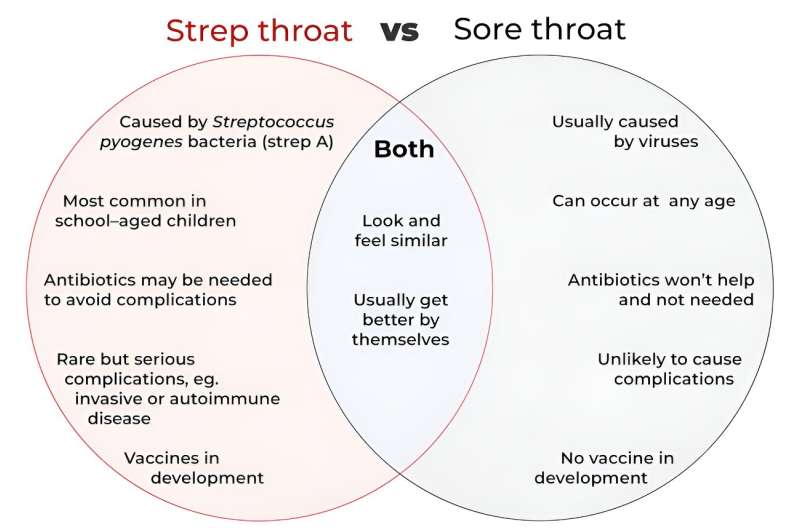This article has been reviewed according to Science X's editorial process and policies. Editors have highlighted the following attributes while ensuring the content's credibility:
fact-checked
trusted source
written by researcher(s)
proofread
What's the difference between 'strep throat' and a sore throat? A vaccine is being developed for one of them

It's the time of the year for coughs, colds and sore throats. So you might have heard people talk about having a "strep throat."
But what is that? Is it just a bad sore throat that goes away by itself in a day or two? Should you be worried?
Here's what we know about the similarities and differences between strep throat and a sore throat, and why they matter.
How are they similar?
It's difficult to tell the difference between a sore throat and strep throat as they look and feel similar.
People usually have a fever, a bright red throat and sometimes painful lumps in the neck (swollen lymph nodes). A throat swab can help diagnose strep throat, but the results can take a few days.
Thankfully, both types of sore throat usually get better by themselves.
How are they different?
Most sore throats are caused by viruses such as common cold viruses, the flu (influenza virus), or the virus that causes glandular fever (Epstein-Barr virus).
These viral sore throats can occur at any age. Antibiotics don't work against viruses, so if you have a viral sore throat, you won't get better faster if you take antibiotics. You might even have some unwanted antibiotic side-effects.
But strep throat is caused by Streptococcus pyogenes bacteria, also known as strep A. Strep throat is most common in school-aged children, but can affect other age groups. In some cases, you may need antibiotics to avoid some rare but serious complications.
In fact, the potential for complications is one key difference between a viral sore throat and strep throat.
Generally, a viral sore throat is very unlikely to cause complications (one exception is those caused by Epstein-Barr virus which has been associated with illnesses such as chronic fatigue syndrome, multiple sclerosis and certain cancers).
But strep A can cause invasive disease, a rare but serious complication. This is when bacteria living somewhere on the body (usually the skin or throat) get into another part of the body where there shouldn't be bacteria, such as the bloodstream. This can make people extremely sick.
Invasive strep A infections and deaths have been rising in recent yearsaround the world, especially in young children and older adults. This may be due to a number of factors such as increased social mixing at this stage of the COVID pandemic and an increase in circulating common cold viruses. But overall the reasons behind the increase in invasive strep A infections are not clear.
Another rare but serious side effect of strep A is autoimmune disease. This is when the body's immune system makes antibodies that react against its own cells.
The most common example is rheumatic heart disease. This is when the body's immune system damages the heart valves a few weeks or months after a strep throat or skin infection.
Around the world, more than 40 million people live with rheumatic heart disease and more than 300,000 die from its complications every year, mostly in developing countries.
However, parts of Australia have some of the highest rates of rheumatic heart disease in the world. More than 5,300 Indigenous Australians live with it.
Why do some people get sicker than others?
We know strep A infections and rheumatic heart disease are more common in low socioeconomic communities where poverty and overcrowding lead to increased strep A transmission and disease.
However, we don't fully understand why some people only get a mild infection with strep throat while others get very sick with an invasive disease.
We also don't understand why some people get rheumatic heart disease after strep A infections when most others don't. Our research team is trying to find out.
How about a vaccine for strep A?
There is no strep A vaccine but manygroups in Australia, New Zealandandworldwide are working towards one.
For instance, Murdoch Children's Research Institute and Telethon Kids Institute have formed the Australian Strep A Vaccine Initiative to develop strep A vaccines. There's also a global consortium working towards the same goal.
Companies such as Vaxcyte and GlaxoSmithKline have also been developing strep A vaccines.
What if I have a sore throat?
Most sore throats will get better by themselves. But if yours doesn't get better in a few days or you have an ongoing fever, see your GP.
Your GP can examine you, consider running some tests and help you decide if you need antibiotics.
This article is republished from The Conversation under a Creative Commons license. Read the original article.![]()



















